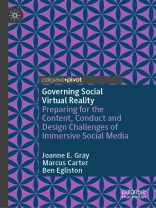In this ground-breaking book, we navigate the uncharted terrain of social virtual reality (VR), a technology that, while offering unprecedented immersive experiences, brings forth significant governance challenges. By merging theoretical insights with practical examples, the book examines the risks of harm in social VR environments, including both content and conduct issues. It charts a course for developing inclusive and safe social VR spaces that are respectful of diverse users’ rights and needs, laying out essential principles for policymakers, developers and regulators. The book is an urgent call to proactively shape the burgeoning field of VR for the betterment of all.
表中的内容
Part I: What needs governing?.- Chapter 1: Introduction.- Chapter 2: Content Harms in Social VR: Abuse, Misinformation, Platform Cultures and Moderation.- Chapter 3: Conduct Harms in Social VR: Embodied Harassment, Gender-Based Harm and Toxic Cultures.- Chapter 4: Children and Social VR: Physiological, Psychological and Social Harms.- Part II: How do we govern?.- Chapter 5: Designing for Safety, Privacy and Inclusivity in Social VR.- Chapter 6: Trust and Safety in Social VR: Current Industry Practices.- Chapter 7: Regulating Social VR: Limitations and Tensions in Global Policy and Governance.- Chapter 8: Conclusion.
关于作者
Dr. Joanne E. Gray is a Lecturer in Digital Cultures at The University of Sydney, Chief Investigator at the International Digital Policy Observatory, and Commissioning Editor of the journal Policy & Internet.
Dr. Marcus Carter is a Professor of Human-Computer Interaction at The University of Sydney and holds an ARC Future Fellowship on ‘The monetisation of children in the digital games industry’.
Dr. Ben Egliston is a Lecturer in Digital Cultures at The University of Sydney and holds an ARC DECRA Fellowship on ‘Paying and playing: Assessing and regulating digital games-as-a-service’.












